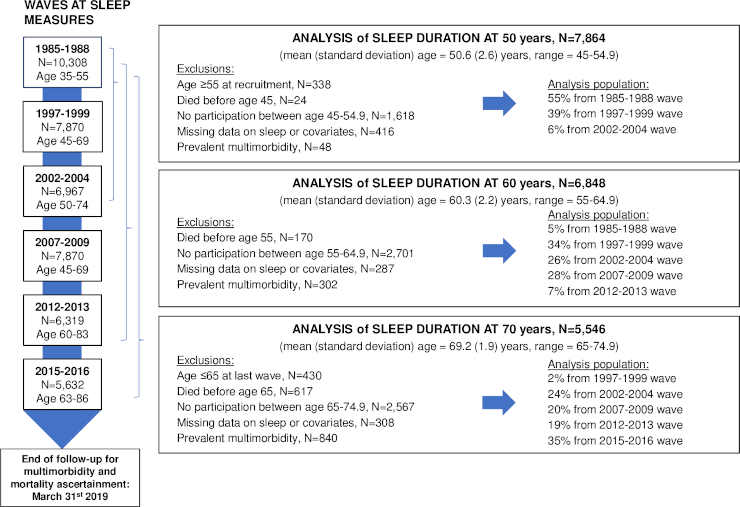According to a recent study led by researchers from University College London, getting less than five hours of sleep in your middle to late years may increase your risk of developing at least two chronic diseases. The study adds to the growing body of studies emphasizing the value of getting a good night’s sleep.
The health and sleep patterns of more than 7,000 men and women from the Whitehall II cohort study who were 50, 60, and 70 years old were examined.
Researchers analyzed the association between short sleep duration, mortality, and the presence of two or more chronic conditions (multimorbidity) such as cardiovascular disease, cancer, or diabetes over a 25-year period.
Sleeping Less Than Five Hours A Night
In comparison to people who slept for up to seven hours, those who reported getting five hours of sleep or less at age 50 had a 20% higher chance of receiving a chronic disease diagnosis and a 40% higher chance of receiving two or more over the course of 25 years.
In addition, compared to people who slept for up to seven hours, those who slept for five hours or less at the ages of 50, 60, and 70 had a 30% to 40% higher risk of multimorbidity.
Researchers also found that sleeping less than five hours a night at age 50 was linked to a 25% higher risk of dying in the next 25 years. This link is mostly caused by the fact that not getting enough sleep makes you more likely to get chronic diseases, which in turn make you more likely to die.
“Multimorbidity is on the rise in high-income countries and more than half of older adults now have at least two chronic diseases. This is proving to be a major challenge for public health, as multimorbidity is associated with high healthcare service use, hospitalizations and disability,”
said lead author Dr. Severine Sabia.
As people age, their sleeping patterns and habits shift. However, seven to eight hours of sleep each night is suggested, as sleep lengths longer or shorter than this have been linked to specific chronic conditions.
“To ensure a better night’s sleep, it is important to promote good sleep hygiene, such as making sure the bedroom is quiet, dark and a comfortable temperature before sleeping. It’s also advised to remove electronic devices and avoid large meals before bedtime. Physical activity and exposure to light during the day might also promote good sleep,”
she added.
Long Sleepers

Researchers also examined whether getting a long night’s sleep — nine hours or more — had an impact on health outcomes as part of the study. Long sleep times at age 50 did not seem to be linked to having more than one disease in healthy people.
On the other hand, participants who already had a chronic condition were 35% more likely to get another illness if they slept for a long time. Researchers believe this could be linked to underlying health issues interfering with sleep.
“Getting enough sleep allows your body to rest. There are a host of other ways that poor sleep could increase the risk of heart disease or stroke, including by increasing inflammation and increasing blood pressure,”
said Jo Whitmore, senior cardiac nurse at the British Heart Foundation.
Study Strengths And Weaknesses
This study’s long follow-up and repeated measures, which allowed for analyses of sleep duration at ages 50, 60, and 70 as well as sleep duration trajectories over this age range, are among its key strengths. The use of multistate models offers additional insight into the relationship between sleep duration and the progression of disease when compared to traditional analyses that looked at associations between sleep duration and health outcomes.
There are, however, some limitations to the study to note.
First, researchers utilized self-reported data on sleep, which is susceptible to reporting bias; however, data from 4,000 people whose sleep was recorded by an electronic device support the findings. Second, only information on those in their 60s and 70s was available for sleep quality.
The only people in the Whitehall II study are civil servants. At the time they were recruited, they were all working, so it’s likely that their physical and mental health is better than that of the general population.
Fourth, most of the participants were white, which was typical of the country in 1991. It is not known if the results apply to people of other races and ethnicities.
Reference:
Sabia S, Dugravot A, Léger D, Ben Hassen C, Kivimaki M, Singh-Manoux A (2022) Association of sleep duration at age 50, 60, and 70 years with risk of multimorbidity in the UK: 25-year follow-up of the Whitehall II cohort study. PLoS Med 19(10): e1004109.
Related Posts:
- Alzheimer’s Disease: Poor Sleep May Increase Your Risk
- Prebiotics May Enhance Sleep Quality After A Stressful Event
- New Sleep-promoting Neurons Found In The Zona Incerta
Last Updated on December 7, 2022
